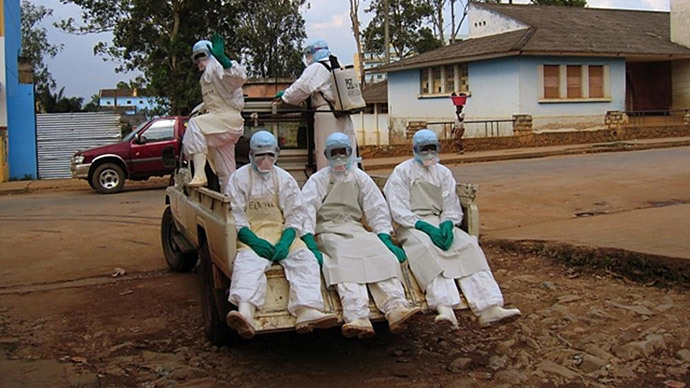The deadly epidemic, which has killed at least 59 people, in Guinea, West Africa, and could have spread to neighboring Sierra Leone, has been confirmed to be Ebola, according to government officials.
Following failed attempts by medical experts in Guinea to
identify the disease, which started claiming lives six weeks ago,
samples of the virus were sent to scientists in the French city
of Lyon, who confirmed the virus was Ebola.
"The Ebola fever epidemic raging in southern Guinea,
including the prefectures of Gueckedou and Macenta, since
February 9 has left at least 59 dead out of 80 cases identified
by our services on the ground," the Guinean health
ministry’s chief disease prevention officer, Sakoba Keita,
announced on Saturday, according to AFP.
The disease, which has diarrhoea, vomiting and bleeding among its
symptoms and kills between 25 and 90 percent of those who fall
sick, depending on the virus’s strain, has never before been
registered in Guinea. It has now been found in three southeastern
towns and in the capital, Conakry.
The disease could have also spread to neighboring Sierra Leone,
according to World Health Organization (WHO) officials, who
reported cases showing similar symptoms there.
A 14-year-old boy died in Sierra Leone’s eastern Kailahun
District, reportedly after he attended a funeral in Guinea of one
Ebola victim, chief medical officer, Dr. Brima Kargbo said, as
cited by Reuters.
The official said a medical team was investigating the death and
looking for people the boy might have been in contact with before
he died.
The international humanitarian organization, Medecins Sans
Frontieres (MSF), announced on Saturday it already had 24
doctors, nurses, logisticians and experts in hygiene and
sanitation in Guinea and was further reinforcing its team there.
MSF also said it was flying in 33 metric tons of medicines and
equipment and was setting up isolation units in the affected
towns in Guinea.
"These structures are essential to prevent the spread of the
disease, which is highly contagious," Dr. Esther Sterk,
MSF's tropical medicine adviser, said in a statement.
"Specialized staff are providing care to patients showing
signs of infection."
Ebola haemorrhagic fever is one of the deadliest viral diseases
known to humankind, according to the WHO. There’s no vaccine
against the virus and the disease is treated by general
supportive therapy.
It was first identified in 1976 in Sudan and Congo. It is
believed to have been passed onto humans from sick animals -
chimpanzees, gorillas, monkeys, forest antelope, and fruit bats.
The highly contagious virus is transmitted by direct contact with
the blood, body fluids and tissues of those infected.


